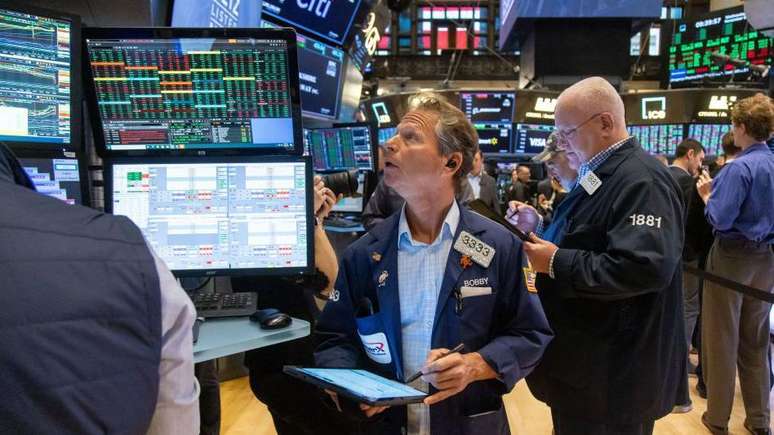Trump has promised to impose tariffs on all foreign goods. If it goes ahead, many smaller economies may be forced to respond in kind.
Donald Trump promised during his campaign that he would tax all goods imported into the United States if he returned to the White House. After his victory, companies and economists around the world are eager to find out just how serious he is.
Trump sees tariffs as a way to grow the American economy, protect jobs and increase tax revenue.
In the past it has imposed tariffs on specific countries, such as China, or on certain sectors, such as steel.
But Trump’s campaign promise to impose tariffs of 10% to 20% on all foreign goods could affect prices around the world.
Last month it seemed to have taken aim at Europe.
“The European Union seems so beautiful, so lovely, doesn’t it? All the small European countries together… They don’t want our cars. They don’t want our agricultural products,” he said.
“They sell millions and millions of cars in the United States. No, no, no, they will have to pay a high price.”
Shares of BMW, Mercedes and Volkswagen fell between 5% and 7% after Trump’s victory was confirmed. The United States is the largest export market for German automakers.
During the campaign, Trump said the tariffs were the answer to a number of issues, including containing China and preventing illegal immigration.
“Tariff is the greatest word in the dictionary,” he said. It’s a weapon he clearly intends to use.
While much of this rhetoric and conduct targets China, the issue doesn’t stop there.
Some jurisdictions, such as the European Union, are already drawing up lists of pre-emptive retaliatory actions against the United States after ministers failed to take Trump’s previous threats regarding tariffs, which he subsequently imposed, seriously enough.
Finance ministers from the G7, a group of seven of the world’s richest countries, said last week that they would try to remind the Trump-led United States of the need to have allies in the world economy because “the idea is not is to start a trade war.”
However, if “broad and very strong power is used,” Europe will quickly evaluate its response.
In the past, the European Union has imposed tariffs on iconic American products such as Harley Davidson motorcycles, Bourbon whiskey and Levi’s jeans in response to U.S. taxes on steel and aluminum.
A representative of a major eurozone central bank said that US tariffs alone “would not be inflationary in Europe, but that depends on what Europe’s reaction is.”
Last month, the International Monetary Fund (IMF) said a major trade war could hit the world economy by 7%, equivalent to the size of the French and German economies combined.
There are important questions for the British government about where exactly the post-Brexit UK should position itself in a plausible – if not certain – transatlantic trade war.
So far the UK’s movement has been to move closer to the European bloc, including on food and agricultural standards. This would make it very difficult to reach a trade agreement with the United States.
The Biden administration was not interested in such an agreement. Trump’s still very influential chief trade negotiator, Bob Lighthizer, even said that the assumption that the UK would remain close to the European Union to help its companies prevented him from seeking a deal.
“They’re a much bigger business partner to you than we are,” he told me in an interview.
The UK might try to remain neutral, but would struggle to avoid the crossfire, especially when it comes to trade in pharmaceuticals and cars.
The British government’s rhetoric suggests it may be trying to be a peacemaker in global trade wars, but would anyone listen?
The British could choose sides, seeking exemption from Trump’s more general tariffs.
Diplomats were encouraged by economic advisers who were more pragmatic about the president-elect, who suggested that friendly allies could have gotten a better deal.
Or would the world benefit more if the UK joined forces with the European Union to avoid such trade tariffs?
Away from the United States, how about serving as an example to the rest of the world?
If the world’s largest economy resorts to mass protectionism, it will be difficult to convince many smaller economies not to do the same.
All of this is open. Trump’s warnings can be taken seriously. Nothing is certain, but this is how trade wars can start.
Source: Terra
Rose James is a Gossipify movie and series reviewer known for her in-depth analysis and unique perspective on the latest releases. With a background in film studies, she provides engaging and informative reviews, and keeps readers up to date with industry trends and emerging talents.




![Plus Belle La Vie Adher: What awaits you on Tuesday, July 15 in 376 Episodes, July 15, 2025 [SPOILERS] Plus Belle La Vie Adher: What awaits you on Tuesday, July 15 in 376 Episodes, July 15, 2025 [SPOILERS]](https://fr.web.img6.acsta.net/img/60/25/602558db87d6c8410a0a958afc82dcb8.jpg)

-1jyajqq3d5lya.jpg)
-1hrlykellx8ae.jpg)
